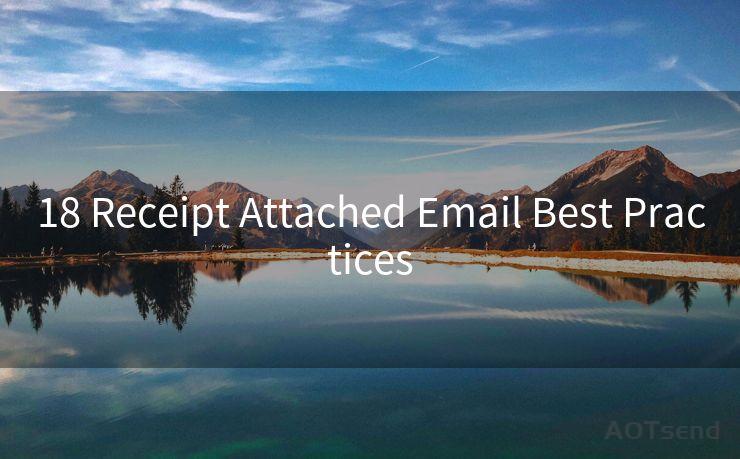18 Receipt Attached Email Best Practices




In the modern business world, emails with attached receipts are a common form of communication. Whether you're sending an invoice, a purchase confirmation, or any other type of receipt, it's crucial to follow best practices to ensure clarity, professionalism, and legal compliance. Here are 18 best practices for sending emails with attached receipts.
1. Clear and Concise Subject Line
Start with a subject line that clearly states the purpose of the email, such as "Invoice #1234 Attached" or "Purchase Confirmation for Your Order". This helps the recipient understand the email's content at a glance.
2. Professional Greeting
Always begin your email with a professional greeting, addressing the recipient by name if possible. This sets the tone for a formal and respectful communication.
3. Introduction to the Receipt
Briefly explain the purpose of the attached receipt. For example, "Please find attached the invoice for the services rendered in January."
4. Attachment Naming Convention
Use a clear and consistent naming convention for your attachments. Include relevant information like the invoice number, date, or customer name.
5. Attachment Format
Ensure the attachment is in a universally readable format like PDF. This ensures compatibility across different devices and operating systems.
6. Virus-Free Attachments
Always scan attachments for viruses before sending. This protects your recipients and maintains your professional reputation.
7. Accuracy of Information
Double-check all the information on the receipt, including dates, amounts, and descriptions, to ensure accuracy and avoid any confusion.

8. Privacy and Confidentiality
If the receipt contains sensitive information, ensure that the email and attachment are secure. Consider using encrypted email services or secure file transfer protocols.
9. Call to Action
Include a clear call to action, such as "Please review the attached invoice and make payment by the due date." This provides clarity on the next steps expected from the recipient.
10. Payment Details
If payment is required, provide clear instructions on how and where to make the payment. Include all necessary banking details or links to online payment gateways.
11. Contact Information
Always provide your contact information in case the recipient has any questions or concerns about the receipt.
12. Professional Closing
End your email with a professional closing, such as "Sincerely" or "Best regards," followed by your name and position.
13. Avoid Unnecessary Attachments
Only attach files that are relevant to the email's content. Avoid attaching unrelated or unnecessary documents.
🔔🔔🔔
【AOTsend Email API】:AOTsend is a Managed Email Service for sending transactional emails. Support Email Types: reminders, authentication, confirmations, notifications, verification codes, invoices, password resets, account activations, billing statements, two-factor authentication (2FA), and one-time passwords (OTP) emails, etc. $0.28 per 1000 Emails. 99% Delivery, 98% Inbox Rate.
You might be interested in:
Why did we start the AOTsend project, Brand Story?
What is a Managed Email API, How it Works?
Best 25+ Email Marketing Platforms (Authority,Keywords&Traffic Comparison)
Best 24+ Email Marketing Service (Price, Pros&Cons Comparison)
Email APIs vs SMTP: How they Works, Any Difference?
14. Optimize for Mobile
Ensure that your email and attachment are optimized for mobile viewing. This enhances readability and accessibility for recipients on the go.
15. Test Email
Send a test email to yourself before sending it to the actual recipient. This allows you to check the formatting, readability, and attachment functionality.
16. Comply with Legal Requirements
If your business operates in a region with specific legal requirements for receipts or invoices, ensure that your email and attachment comply with these regulations.
17. Archive for Future Reference
Keep a copy of the email and attachment in your records. This can be useful for future reference or in case of any disputes.
18. Follow-Up
If necessary, don't hesitate to follow up with the recipient to confirm receipt of the email and attachment, especially if payment or action is urgently required.
By following these best practices, you can ensure that your emails with attached receipts are clear, professional, and effective. This not only enhances communication but also protects your business's reputation and legal compliance.




Scan the QR code to access on your mobile device.
Copyright notice: This article is published by AotSend. Reproduction requires attribution.
Article Link:https://www.mailwot.com/p4676.html



